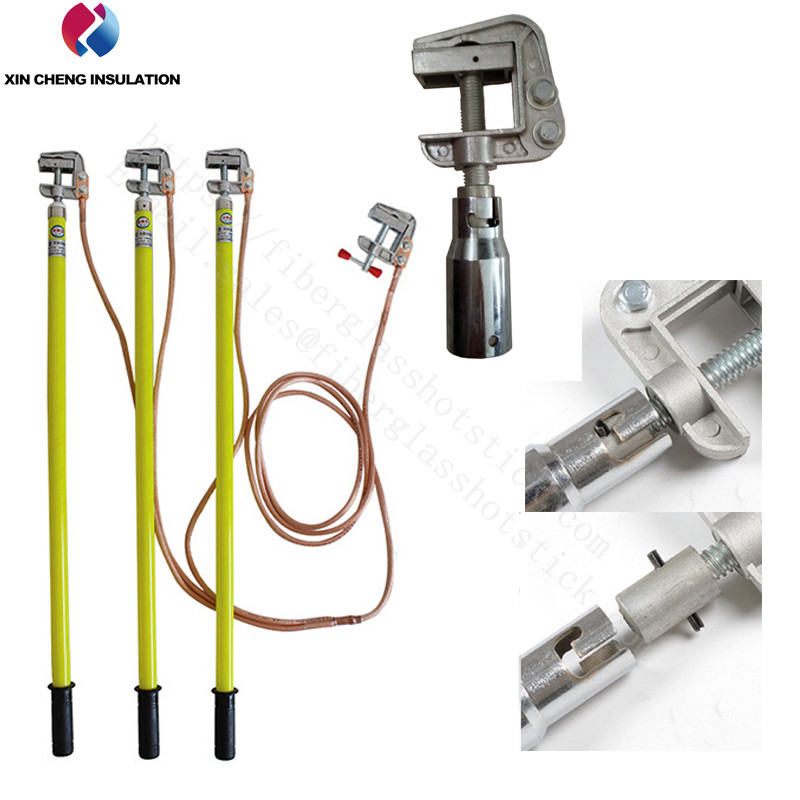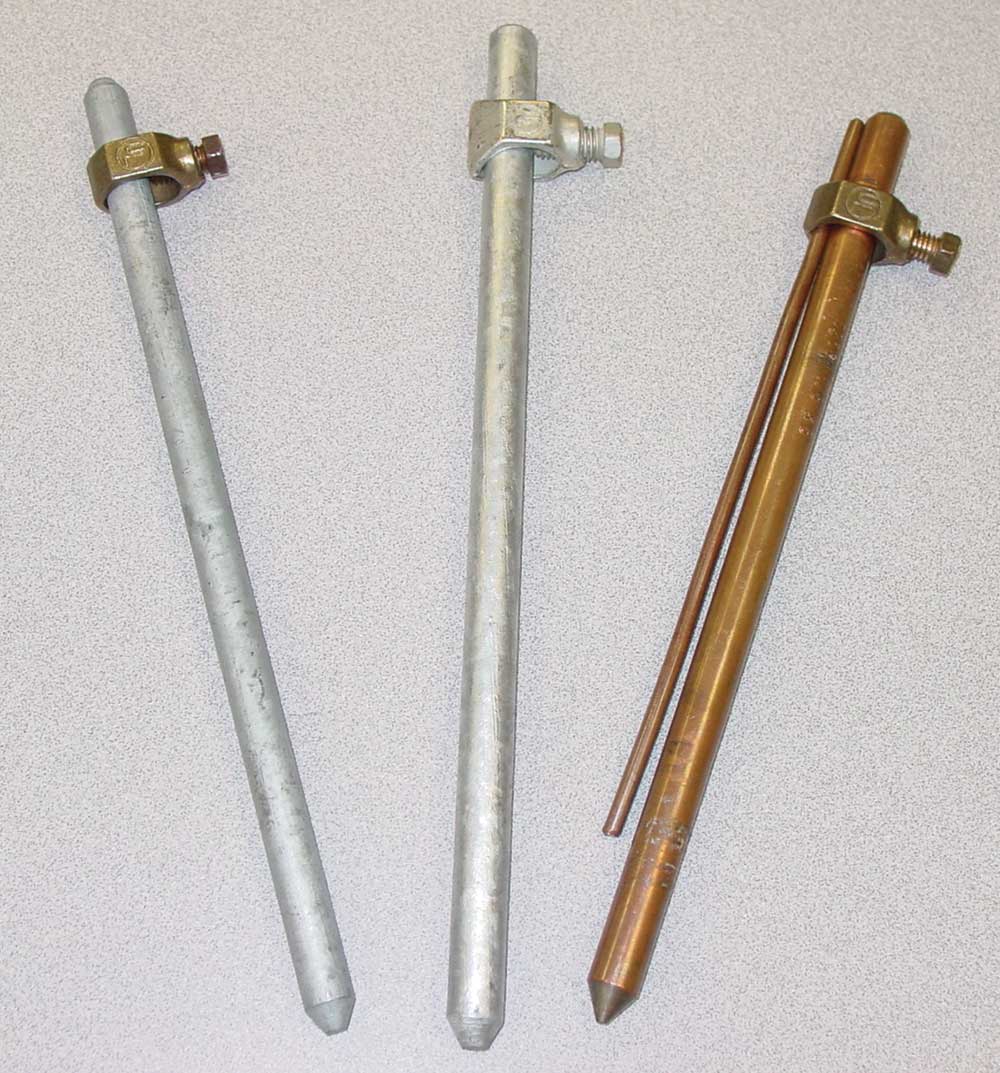Casual Tips About Can Aluminum Be Used As A Ground Rod

Grounding Dilemmas
1. The Curious Case of Aluminum Ground Rods
So, you're thinking about grounding your electrical system, huh? Smart move! A good grounding system is like a superhero for your appliances and, more importantly, for you. It protects against electrical shocks and surges. Now, the question pops up: Can you use aluminum as a ground rod? It's a valid query, and one that requires a little bit of digging to answer properly. After all, you don't want any electrical mishaps turning your home into a light show of the wrong kind!
The quick answer is generally no, aluminum is not recommended, and often prohibited, for use as a ground rod in most residential and commercial electrical systems. The more complex answer? Well, let's just say there are reasons rooted in science, safety, and common sense. Ground rods are typically made of copper or copper-clad steel for a reason. They need to be strong, conductive, and corrosion-resistant. Imagine building a house on a foundation of marshmallows — that's sort of what using the wrong material for grounding feels like. Sure, it might seem okay for a little while, but eventually, you're going to have problems.
Think of your grounding system as a highway for errant electrical currents. When things go wrong — a lightning strike, a surge from the power company — you want that electricity to have a clear, low-resistance path to safely dissipate into the earth. Aluminum, while a decent conductor, simply doesn't hold up as well as copper or copper-clad steel in that role, especially when exposed to the elements over the long haul. Let's explore some of the reasons why.
One of the major issues with aluminum is its tendency to corrode. When aluminum corrodes, it forms a layer of aluminum oxide, which is actually an insulator (a material that resists electrical current). This insulating layer effectively reduces the conductivity of the aluminum, making it a poor choice for a ground rod. Over time, this corrosion can worsen, leading to a complete failure of the grounding system. And nobody wants that! We will explore more about corrosion in the later subtopic.

The Problem with Aluminum
2. Why Rust Isn't Just an Automotive Issue
Corrosion. It's the nemesis of metals everywhere, and aluminum is no exception. While aluminum doesn't "rust" in the same way iron does (forming reddish-brown iron oxide), it still corrodes. As mentioned before, it forms aluminum oxide, a tough, whitish layer. Sounds protective, right? Wrong! Unlike the oxide layer on some metals, aluminum oxide is not a good conductor of electricity. It's like putting a tiny speed bump on that electrical highway, and over time, those speed bumps can become full-fledged roadblocks.
This corrosion is exacerbated by the fact that ground rods are buried in the earth. Soil contains moisture, salts, and other minerals that can accelerate the corrosion process. Different soil types have different levels of acidity and alkalinity, which can further influence the rate of corrosion. So, even if you live in a relatively dry area, the soil itself can still create a corrosive environment for aluminum. This is a crucial thing to consider when you are choosing your grounding rods.
Imagine you're trying to send a package across town. If the roads are clear, it'll get there quickly. But if the roads are filled with potholes (corrosion), the package will be delayed or might not arrive at all. Similarly, a corroded ground rod will have a higher resistance, meaning it won't effectively divert excess electrical current. This can leave your electrical system vulnerable to damage during a surge. Think about that next time you see a thunderstorm rolling in!
Furthermore, galvanic corrosion can occur if aluminum is in contact with other metals in the grounding system, such as copper. Galvanic corrosion is an electrochemical process where one metal corrodes preferentially when it's in electrical contact with a different metal and both are immersed in an electrolyte (like soil moisture). Since copper is often used for grounding wires, this creates a perfect storm for corrosion if you were to use aluminum for the ground rod. It's best to stick with compatible materials to avoid any unwanted chemical reactions.

The 5 Ft. Ground Rod And Its Littleknown Use In NEC IAEI Magazine
Better Alternatives
3. The Heroes of Grounding
So, if aluminum is a no-go, what should you use? Copper and copper-clad steel are the reigning champions of ground rod materials, and for good reason. Copper is an excellent conductor of electricity, meaning it provides a low-resistance path for current to flow. It's also relatively corrosion-resistant, although it can still corrode over time, especially in acidic soils.
Copper-clad steel offers the best of both worlds. It has a steel core for strength and a copper coating for conductivity and corrosion resistance. The steel core provides the structural integrity needed to drive the rod into the ground, while the copper coating ensures good electrical contact with the soil. It's like having a superhero with both super strength and lightning-fast reflexes! In the grounding world, copper-clad steel is about as good as it gets. It's durable, conductive, and will stand the test of time (and weather).
When installing copper or copper-clad steel ground rods, it's important to follow local electrical codes and best practices. This typically involves driving the rod deep enough into the ground to ensure good contact with the soil. The depth required will vary depending on the soil type and local regulations, but generally, a minimum of 8 feet is recommended. Make sure to connect the grounding wire securely to the ground rod using a proper clamp or connector. A loose connection can create resistance and defeat the purpose of the grounding system.
One important thing to keep in mind is that the choice of ground rod material and installation method can have a significant impact on the effectiveness of your grounding system. A properly installed copper or copper-clad steel ground rod will provide a reliable path for excess electrical current to flow to the earth, protecting your home and appliances from damage. A poorly installed or inadequate grounding system, on the other hand, can leave you vulnerable to electrical hazards. Always consult with a qualified electrician if you have any questions or concerns about your grounding system.

How Do I Install Ground Rods? (Part 1) Pipes And Wrenches
Code Considerations
4. Following the Rules for Safety's Sake
Electrical codes are like the rulebooks for electrical safety, and they're in place for a very good reason: to prevent fires, shocks, and other hazards. The National Electrical Code (NEC), which is widely adopted in the United States, provides detailed guidelines for grounding and bonding electrical systems. Most local codes are based on the NEC or a similar standard, so it's important to be familiar with the requirements in your area.
The NEC typically specifies the types of materials that are acceptable for use as ground rods. While the exact wording may vary, the code generally requires ground rods to be made of materials that are corrosion-resistant and have adequate conductivity. Copper and copper-clad steel are typically approved materials, while aluminum is often prohibited or restricted due to its corrosion issues. Make sure you review the latest version of the NEC and any applicable local amendments to ensure that your grounding system complies with the code.
In addition to specifying the materials, the electrical code also sets requirements for the size and number of ground rods. The size of the ground rod is typically determined by the size of the electrical service. For example, a larger service may require a larger diameter ground rod to handle the higher current levels. The code may also require multiple ground rods to be installed in certain situations, such as when the soil resistivity is high. Soil resistivity is a measure of how well the soil conducts electricity, and high resistivity means that the ground is a poor conductor. In such cases, multiple ground rods can be used to lower the overall resistance of the grounding system.
Electrical inspections are a crucial part of ensuring that electrical work is done safely and correctly. When you install a new grounding system or make significant changes to an existing one, you'll likely need to have it inspected by a qualified electrical inspector. The inspector will verify that the grounding system meets the requirements of the electrical code and is installed properly. Don't skip this step! It's a small price to pay for peace of mind and the safety of your home and family.

Electrical Earthing And Grounding Methods, Types Rules
The Final Verdict
5. Why Reinventing the Wheel Isn't Always a Good Idea
So, can you use aluminum as a ground rod? While the idea might seem appealing on the surface (perhaps due to cost or availability), the answer is generally a resounding no. The risks associated with using aluminum as a ground rod outweigh any potential benefits. Corrosion, poor conductivity, and code restrictions all point to the fact that aluminum is simply not the right material for the job.
When it comes to grounding, it's best to stick with the tried and true: copper and copper-clad steel. These materials have a proven track record of providing reliable and effective grounding protection. They are corrosion-resistant, conductive, and comply with electrical codes. While they may cost a bit more upfront, they will save you money and headaches in the long run by preventing electrical damage and ensuring your safety.
Remember, your grounding system is an essential part of your home's electrical infrastructure. It's the first line of defense against electrical surges and faults. Don't cut corners or try to save a few bucks by using substandard materials. Invest in a quality grounding system that will provide reliable protection for years to come. It's one of those things you don't want to skimp on.
Before undertaking any electrical work, it's always a good idea to consult with a qualified electrician. They can assess your specific needs and recommend the best grounding solution for your home. They can also ensure that the installation is done safely and correctly, complying with all applicable codes and regulations. After all, when it comes to electricity, it's always better to be safe than sorry.

FAQ
6. Q
A: While coatings might slow down corrosion, they aren't foolproof and can be damaged over time, especially when the rod is driven into the ground. Any breach in the coating exposes the aluminum to the soil, initiating corrosion and defeating the purpose. The reliability and longevity of the grounding system are paramount, and coatings simply don't provide the necessary assurance compared to inherently corrosion-resistant materials like copper.
7. Q
A: Exercise extreme caution. Just because something is sold online doesn't mean it meets safety standards or local codes. Always verify that any electrical equipment, including ground rods, is certified by a recognized testing laboratory (like UL) and complies with the National Electrical Code (NEC) and your local electrical codes. It's often best to purchase electrical components from reputable suppliers known for carrying certified and compliant products. When in doubt, consult a qualified electrician.
8. Q
A: A failing ground rod can leave your electrical system vulnerable to damage from surges and lightning strikes. It can also increase the risk of electrical shock. Signs of a failing ground rod may include tripped circuit breakers, flickering lights, or a tingling sensation when touching metal appliances. If you suspect your ground rod is corroded or failing, contact a qualified electrician immediately to inspect the grounding system and replace the rod if necessary. Don't wait until a major electrical event occurs to address the problem!